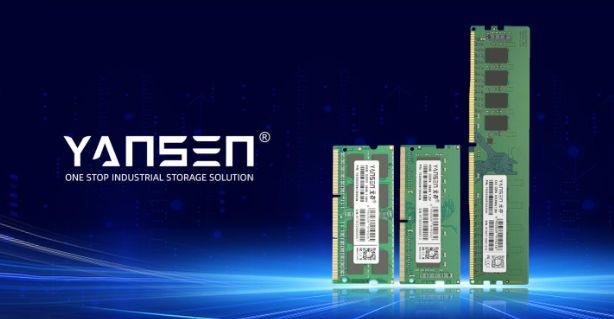A Comprehensive Guide to Industrial-Grade DDR4 Solutions

Memory technology serves as the cornerstone of industrial automation and data processing, playing a critical role in the efficiency and operation of various systems. The development of DDR (Double Data Rate) memory standards, like DDR4 and DDR5, has been pivotal, evolving to meet the increasing demands for speed, efficiency, and reliability in both consumer and industrial applications.
Industrial Market Needs
The industrial memory market is experiencing a significant transformation driven by advancements in industrial automation, IoT, and real-time data processing. There is a growing demand for robust memory solutions capable of withstanding harsh environments and ensuring consistent operation. Industries such as automotive, manufacturing, and telecommunications require memory that can handle high temperatures, vibrations, and electromagnetic interference.
Distinctions Between Industrial-Grade and Consumer-Grade DDR Memory
Industrial-grade DDR memory differs from consumer-grade memory in several key aspects:
- PCB Thickness: Industrial-grade DDR4 PCBs typically consist of 6 to 8 layers, while DDR5 PCBs can reach up to 10 layers in thickness. The number of layers in a PCB directly impacts its design complexity and functionality. Multi-layer PCBs are used for high-density and high-performance electronic circuits because they provide more routing space and better electromagnetic compatibility. They allow for more signal lines and power distribution layers, which are crucial for the reliability of high-density and high-speed circuits.
- Chip Quality: High-quality DDR4 memory chips provide stable and reliable operation. High speed and low latency, broad compatibility, and advanced manufacturing processes. They feature low error rates, excellent power management, and low power consumption, and are rigorously tested for long-term durability.
- Temperature Tolerances: These modules are designed to operate within a broader temperature range, often from -40°C to 85°C, compared to the 0°C to 70°C range of consumer-grade memory.
Industrial DDR4 memory addresses several critical concerns:
- Data Integrity and System Stability: Memory chips that support ECC (Error Correcting Code) functionality can automatically detect and correct errors occurred during data transmission, effectively reducing the risk of potential data errors and ensuring stable system operation.
- Power Efficiency: DDR4 technology reduces operating voltage to 1.2V compared to DDR3’s 1.35V, bringing several advantages such as lower power consumption, reduced heat generation, improved power efficiency, extended battery life in laptops and mobile devices, and support for higher density and faster speeds. These benefits make DDR4 a preferred memory technology for modern computer systems.
- Compatibility: Industrial-grade DDR4 has shown significant improvement in compatibility, meeting the demands of a wide range of systems such as PLC (Programmable Logic Controller), DCS (Distributed Control System), SCADA (Supervisory Control and Data Acquisition), CMS (Condition Monitoring System), Industrial PCs and Edge Computing Devices in diverse industrial environments.
 Application Scenarios Optimized for Industrial DDR4
Application Scenarios Optimized for Industrial DDR4
Industrial-grade DDR4 memory is engineered to meet the rigorous demands of the industrial sector, where performance and reliability are not just desirable but essential.
- Rail Transit
The field of rail transportation requires high stability and reliability, particularly strict requirements for temperature, vibration resistance, and shock tolerance. Memory modules must operate over a wide temperature range and withstand the vibrations and shocks associated with vehicle operation. Additionally, there are stringent requirements for DDR interfaces to ensure the consistency and reliability of signals and commands during transmission. DDR4 products feature gold finger plating technology that greatly enhance conductivity, effectively preventing oxidation, wear, and chemical reactions, ensuring stable operation of industrial control equipment in harsh environments.
- Embedded Systems
Embedded systems within industrial devices benefit from the compact size and low power consumption of industrial-grade DDR4 memory. This makes it ideal for applications where space is at a premium and power efficiency is critical, such as in portable or remote industrial equipment. In industrial automation, DDR4 memory’s rapid data exchange capabilities are essential for coordinating the actions of machines, sensors, and controllers. The industrial-grade resilience of these memory modules allows them to function seamlessly in the face of vibrations, dust, and temperature extremes common on the factory floor.
- Medical
DDR4 products also have extensive applications in the medical equipment field. Industrial-grade DDR4 meets the high-speed data processing and reliability requirements. Furthermore, the working environment of medical devices often requires DDR4 to have functions such as waterproof, dustproof, and anti-static. The conformal coating technology of DDR4 can meet these requirements, ensuring the safety of the equipment during operation.

YANSEN DDR4 DRAM – A Strategic Choice for Industrial Applications
YANSEN’s DDR4 DRAM lineup is designed specifically for industrial applications, offering a range of configurations tailored to meet diverse data demands. Their products are known for their high efficiency, reliability, and ease of integration into various industrial systems.
Key Features
- Operational Metrics: YANSEN’s DDR4 DRAM offers high speeds of 2666/3000/3200 MT/s, ensuring high-speed data processing capabilities that are essential for demanding industrial applications.
- Reliability Under Various Operating Conditions: YANSEN ensures that DDR4 DRAM modules maintain high quality operation even under extreme conditions. These modules are built to withstand wide temperature ranges, high humidity, and physical shocks, making them suitable for use in rugged industrial environments.
- Compatibility and Integration: YANSEN’s DDR4 modules are designed for compatibility with a broad range of industrial systems, motherboards and devices. It has passed compatibility testing with ASUS, MSI, GIGABYTE’s and other testing devices. This ease of integration reduces the time and effort required to upgrade or replace memory in existing setups, ensuring minimal downtime and disruption.
- Various Options: YANSEN provides various options, including U-DIMM and SODIMM types, with capacities ranging from 4GB to 32GB, input voltage ranges from 1.35V to 1.2V and frequency selection covers 2666/3000/3200 MT/s to accommodate the diverse data demands of industrial applications.
Conclusion
DDR4 memory continues to play an essential role in meeting the stringent requirements of industrial applications. Its ability to deliver high performance, power efficiency, and reliability makes it a critical component in the advancement of industrial automation, HPC, embedded systems, and real-time analytics. YANSEN’s DDR4 DRAM solutions exemplify the best of what industrial-grade memory can offer, providing robust and versatile options that ensure industrial systems operate efficiently and reliably.
YANSEN products undergo rigorous testing, including performance tests, stability tests, compatibility tests, system application tests, power consumption tests, and high and low temperature tests. To fully prepare for the challenges of industrial-grade application scenarios, YANSEN products also undergo electromagnetic compatibility (EMC) testing, fault tolerance testing, BIOS and operating system compatibility testing, and temperature tests ranging from -20℃ to 75℃ and -40℃ to 85℃. Additionally, they pass EIA-364-65B anti-sulfuration tests and a series of aging, functional, and structural stress reliability tests such as TC, THB, HTOL, LTOL, shock, torsion, and mechanical impact tests. These comprehensive tests validate the stability and reliability of YANSEN products in harsh environments, including wide temperature ranges, vibrations, and shocks.
For more information on YANSEN’s industrial-grade memory solutions, visit their official product page.





